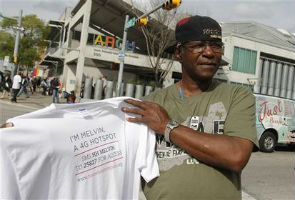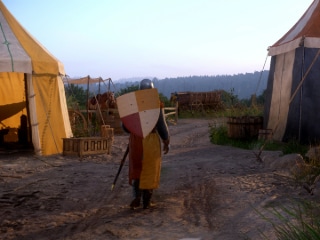- Home
- Internet
- Internet News
- 'Homeless Hotspot' stunt stirs debate at SXSW
'Homeless Hotspot' stunt stirs debate at SXSW
By Associated Press | Updated: 5 June 2012 16:57 IST

Click Here to Add Gadgets360 As A Trusted Source

Advertisement
A charitable marketing program that paid homeless people to carry Wi-Fi signals at South By Southwest has drawn widespread debate at the annual Austin conference and around the country.
BBH Labs, a unit of the global marketing agency BBH, gave 13 people from Austin's Front Steps Shelter mobile Wi-Fi devices and T-shirts that announced "I am a 4G Hotspot." The company paid them $20 up front and a minimum of $50 a day for about six hours work, said Emma Cookson, chairwoman of BBH New York.
She called the experiment a modernized version of homeless selling street newspapers. All of the money paid for Wi-Fi - an often difficult thing to find at SXSW - went to the participants, who were selected in partnership with Front Steps. ($2 was the recommended donation for 15 minutes of use.)
But many have called the program exploitive. Wired.com wrote that it "sounds like something out of a darkly satirical science-fiction dystopia." Technology blog ReadWriteWeb called it a "blunt display of unselfconscious gall." The topic became one of the most popular in the country on Twitter by Tuesday.
Critics have claimed the experiment turned homeless people into inanimate objects for the benefit of well-heeled techies. In an online op-ed, The Washington Post wondered "Have we lost our humanity?"
Cookson took pains to say BBH was listening to criticism of the experiment, which ended Monday. It had been meant to begin Friday but rain delayed its full implementation until Sunday.
"It gives a personal interaction, a connection for homeless people with regular folks with whom they don't often connect and get walked past," says Cookson, who declined to give financial totals but said it was "more than we anticipated."
She said BBH doesn't currently have plans to continue the plan, and that "lots of lots of questions have been raised." Still, she called it "a big success just in terms of getting attention for the issue and getting debate going."
One of the participants, Dusty White said that the experience of talking with SXSW attendees and earning some cash "made me feel proud."
"I felt like it was a positive thing," said White. "They could have done this with anyone."
Mitchell Gibbs, director of development and communications at Front Steps, said he was initially skeptical after being approached by BBH, but was won over by previous work they've done with the homeless. He put the offer to participants in the shelter's Case Management Program, a step-by-step program to move people out of shelters and off the streets.
"Everybody was educated and aware about the process," said Gibbs. "Everybody was excited by the opportunity to make some money."
Gibbs said the shelter's participants roundly enjoyed the experience.
"We've had more community conversations about homelessness, affordable housing, employment opportunities and shelters than we've had in I can't tell you when," said Gibbs. "We count that as a win."
Said White: "I would do it again."
BBH Labs, a unit of the global marketing agency BBH, gave 13 people from Austin's Front Steps Shelter mobile Wi-Fi devices and T-shirts that announced "I am a 4G Hotspot." The company paid them $20 up front and a minimum of $50 a day for about six hours work, said Emma Cookson, chairwoman of BBH New York.
She called the experiment a modernized version of homeless selling street newspapers. All of the money paid for Wi-Fi - an often difficult thing to find at SXSW - went to the participants, who were selected in partnership with Front Steps. ($2 was the recommended donation for 15 minutes of use.)
But many have called the program exploitive. Wired.com wrote that it "sounds like something out of a darkly satirical science-fiction dystopia." Technology blog ReadWriteWeb called it a "blunt display of unselfconscious gall." The topic became one of the most popular in the country on Twitter by Tuesday.
Critics have claimed the experiment turned homeless people into inanimate objects for the benefit of well-heeled techies. In an online op-ed, The Washington Post wondered "Have we lost our humanity?"
Cookson took pains to say BBH was listening to criticism of the experiment, which ended Monday. It had been meant to begin Friday but rain delayed its full implementation until Sunday.
"It gives a personal interaction, a connection for homeless people with regular folks with whom they don't often connect and get walked past," says Cookson, who declined to give financial totals but said it was "more than we anticipated."
She said BBH doesn't currently have plans to continue the plan, and that "lots of lots of questions have been raised." Still, she called it "a big success just in terms of getting attention for the issue and getting debate going."
One of the participants, Dusty White said that the experience of talking with SXSW attendees and earning some cash "made me feel proud."
"I felt like it was a positive thing," said White. "They could have done this with anyone."
Mitchell Gibbs, director of development and communications at Front Steps, said he was initially skeptical after being approached by BBH, but was won over by previous work they've done with the homeless. He put the offer to participants in the shelter's Case Management Program, a step-by-step program to move people out of shelters and off the streets.
"Everybody was educated and aware about the process," said Gibbs. "Everybody was excited by the opportunity to make some money."
Gibbs said the shelter's participants roundly enjoyed the experience.
"We've had more community conversations about homelessness, affordable housing, employment opportunities and shelters than we've had in I can't tell you when," said Gibbs. "We count that as a win."
Said White: "I would do it again."
Comments
Get your daily dose of tech news, reviews, and insights, in under 80 characters on Gadgets 360 Turbo. Connect with fellow tech lovers on our Forum. Follow us on X, Facebook, WhatsApp, Threads and Google News for instant updates. Catch all the action on our YouTube channel.
Popular on Gadgets
- Samsung Galaxy Unpacked 2026
- iPhone 17 Pro Max
- ChatGPT
- iOS 26
- Laptop Under 50000
- Smartwatch Under 10000
- Apple Vision Pro
- Oneplus 12
- OnePlus Nord CE 3 Lite 5G
- iPhone 13
- Xiaomi 14 Pro
- Oppo Find N3
- Tecno Spark Go (2023)
- Realme V30
- Best Phones Under 25000
- Samsung Galaxy S24 Series
- Cryptocurrency
- iQoo 12
- Samsung Galaxy S24 Ultra
- Giottus
- Samsung Galaxy Z Flip 5
- Apple 'Scary Fast'
- Housefull 5
- GoPro Hero 12 Black Review
- Invincible Season 2
- JioGlass
- HD Ready TV
- Latest Mobile Phones
- Compare Phones
Latest Gadgets
- Tecno Pova Curve 2 5G
- Lava Yuva Star 3
- Honor X6d
- OPPO K14x 5G
- Samsung Galaxy F70e 5G
- iQOO 15 Ultra
- OPPO A6v 5G
- OPPO A6i+ 5G
- Asus Vivobook 16 (M1605NAQ)
- Asus Vivobook 15 (2026)
- Brave Ark 2-in-1
- Black Shark Gaming Tablet
- boAt Chrome Iris
- HMD Watch P1
- Haier H5E Series
- Acerpure Nitro Z Series 100-inch QLED TV
- Asus ROG Ally
- Nintendo Switch Lite
- Haier 1.6 Ton 5 Star Inverter Split AC (HSU19G-MZAID5BN-INV)
- Haier 1.6 Ton 5 Star Inverter Split AC (HSU19G-MZAIM5BN-INV)
© Copyright Red Pixels Ventures Limited 2026. All rights reserved.

![[Partner Content] OPPO Reno15 Series: AI Portrait Camera, Popout and First Compact Reno](https://www.gadgets360.com/static/mobile/images/spacer.png)










